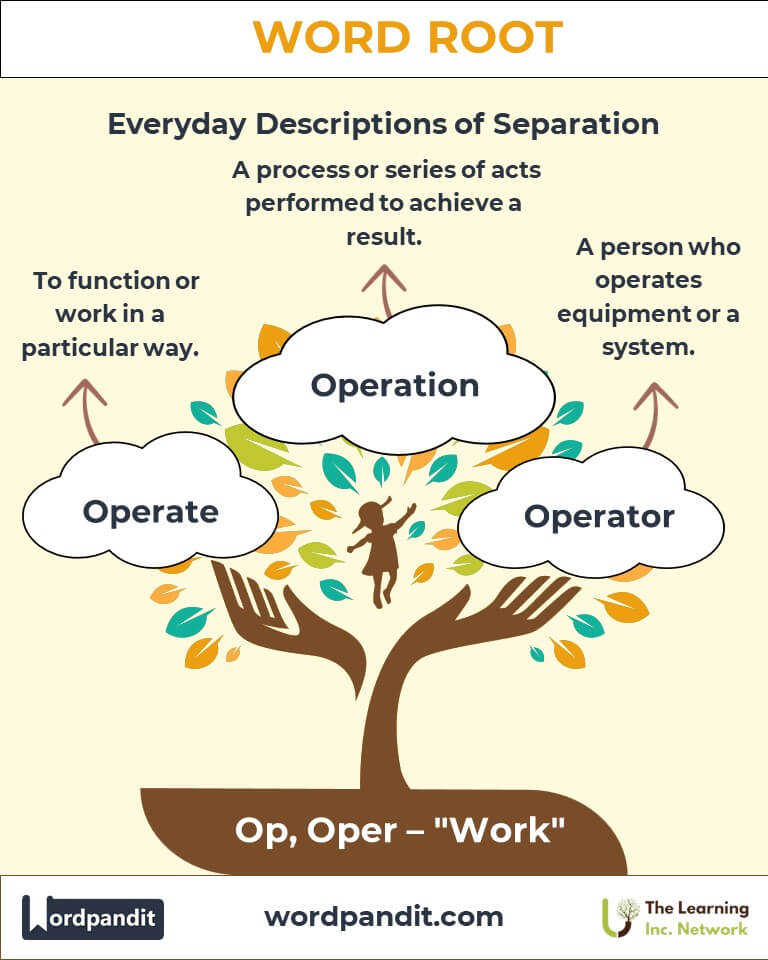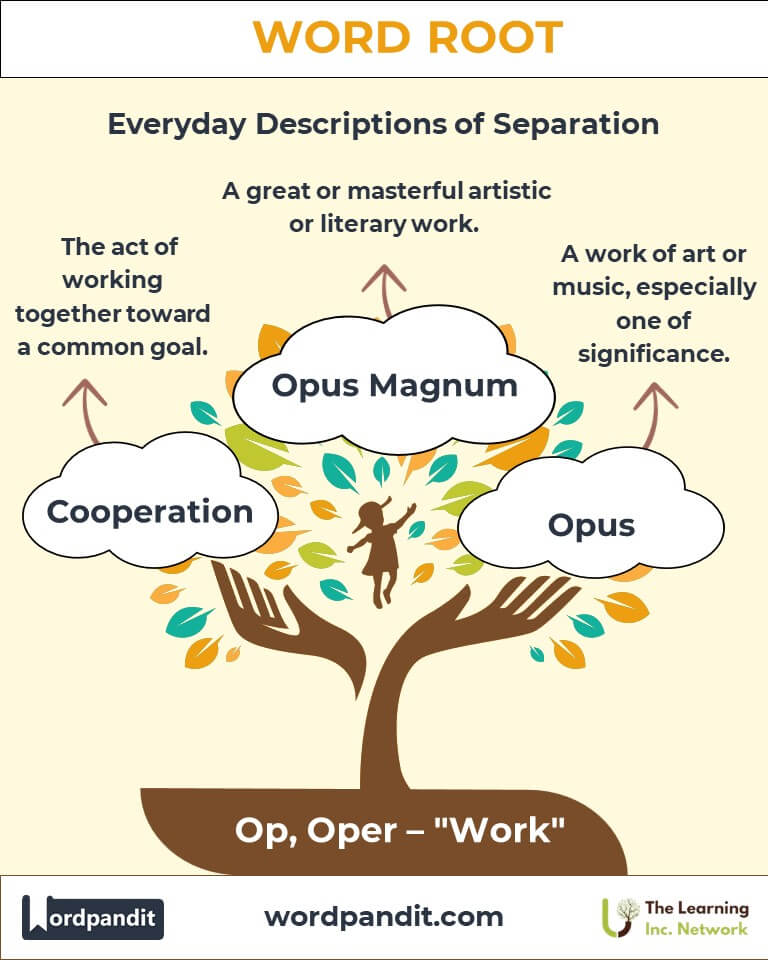Op, Oper: The Power of Work in Language and Meaning
Byline:
Discover how the roots "op" and "oper," derived from the Latin word opus, meaning "work," weave a rich tapestry of productivity, cooperation, and innovation into our vocabulary. From everyday expressions to specialized terminology, these roots highlight the universal importance of work and collaboration.

Table of Contents
- Introduction: The Essence of Op and Oper
- Etymology and Historical Journey
- Mnemonic: Unlocking the Power of Op and Oper
- Common Op and Oper-Related Terms
- Op and Oper Through Time
- Op and Oper in Specialized Fields
- Illustrative Story: Op and Oper in Action
- Cultural Significance of the Op and Oper Roots
- The Op and Oper Family Tree
- FAQs about the Op and Oper Roots
- Test Your Knowledge: Op and Oper Mastery Quiz
- Conclusion: The Living Legacy of Op and Oper
Introduction: The Essence of Op and Oper
What comes to mind when you hear "operate" or "cooperate"? Likely, it's the act of working efficiently or working together to achieve a common goal. The word roots "op" and "oper," meaning "work," originate from Latin and have become cornerstones in language. Their presence in words like "operation" and "cooperation" reflects humanity’s intrinsic relationship with effort, organization, and teamwork.

Etymology and Historical Journey
The roots "op" and "oper" trace back to the Latin opus (work) and operari (to work or operate). During the Middle Ages, these terms began appearing in Old French and later evolved in English to describe systematic work, procedures, and partnerships. Over centuries, these roots expanded into technical, medical, and legal domains, highlighting their enduring relevance.
Mnemonic: Unlocking the Power of Op and Oper
To remember "op" and "oper," think of an "opera"—a grand performance requiring the collaboration of singers, musicians, and stagehands, all working together.
Mnemonic Device:
"In an opera, everyone operates together to create a masterpiece."
Common Op and Oper-Related Terms
- Operate
Definition: To function or work in a particular way.
Example: "The surgeon operates with precision during every procedure." - Cooperation
Definition: The act of working together toward a common goal.
Example: "International cooperation is vital to solving global challenges." - Operation
Definition: A process or series of acts performed to achieve a result.
Example: "The military operation was planned with meticulous detail." - Operator
Definition: A person who operates equipment or a system.
Example: "The crane operator ensured the building materials were safely lifted." - Opus
Definition: A work of art or music, especially one of significance.
Example: "The composer's final opus became an instant classic."
Op and Oper Through Time
- Opus Magnum (Latin: Great Work): Historically referred to a masterful creation, particularly in art or literature. Today, it symbolizes any significant achievement.
- Operate (Medical Evolution): Originally meaning "to perform a task," it became central to surgical terminology in the 17th century, reflecting advancements in medicine.
- Cooperation (Modern Context): Initially used in legal and diplomatic texts, this term now encompasses a wide range of partnerships, from corporate collaborations to community initiatives.
Op and Oper in Specialized Fields
- Medicine: Operation describes surgical procedures that save lives and improve health.
Example: "The operation lasted six hours and was a success." - Business: Cooperation is essential for joint ventures and partnerships.
Example: "Startups thrive on cooperation to share resources and ideas." - Technology: Operator refers to roles managing systems, such as database operators or machine operators.
Example: "An operator ensures the smooth functioning of industrial robots." - Arts: Opus signifies major creative works in music and literature.
Example: "Beethoven's ninth symphony is considered an extraordinary opus."
Illustrative Story: Op and Oper in Action
In the bustling city of Nova, a group of engineers operated a state-of-the-art power plant. One day, a malfunction threatened the entire system. The operators, realizing the need for swift action, cooperated to troubleshoot the issue. They drew upon their knowledge and teamwork to restore operations. Meanwhile, in a nearby theater, an opera unfolded, reminding the audience of the beauty of collaboration in creating something spectacular. Through their work, the engineers and performers showcased the essence of "op" and "oper"—effort and harmony.
Cultural Significance of the Op and Oper Roots
The roots "op" and "oper" symbolize the universal value of work and collaboration. From ancient artisans crafting opuses to modern teams operating cutting-edge technology, these roots highlight the importance of effort and unity. Cultural expressions like "operatic" drama and "cooperative" living reflect their influence on art and society.

The Op and Oper Family Tree
- Labor (Latin: Work):
- Laborious: Requiring a lot of effort.
- Collaborate: To work together.
- Erg (Greek: Work):
- Energy: The capacity to do work.
- Ergonomic: Designed for efficiency and comfort in working environments.
- Tech (Greek: Art, Skill):
- Technique: A method of doing work.
- Technology: The application of scientific knowledge to practical work.

FAQs About the "Op" and "Oper" Word Roots
Q: What do "Op" and "Oper" mean?
A: The roots "Op" and "Oper" come from the Latin "opus," meaning "work." They appear in terms like operation, cooperation, and opus, signifying effort, productivity, and collaboration.
Q: What is the difference between "operation" and "cooperation"?
A: "Operation" refers to a task or process performed to achieve a goal, while "cooperation" emphasizes working together collaboratively to achieve a shared objective.
Q: What does "opus" mean?
A: "Opus" is used to describe a significant work of art, music, or literature. It signifies a masterpiece or notable creation, often the result of effort and creativity.
Q: How does "operate" apply to technology?
A: In technology, "operate" describes the functioning of systems or machines. For example, operators manage processes, while software operates autonomously based on programming.
Q: What is the significance of "operation" in medicine?
A: In medicine, an operation is a surgical procedure performed to treat injuries, diseases, or conditions. It represents precision and teamwork in healthcare.
Test Your Knowledge: "Op" and "Oper" Word Roots Quiz
1. What do the roots "Op" and "Oper" mean?
2. Which word describes working together?
3. What is an "opus"?
4. In which field is "operation" commonly used?
5. What does an "operator" do?
Conclusion: The Living Legacy of Op and Oper
The roots "op" and "oper" underscore the essence of work in human progress. From ancient masterpieces to modern technological systems, they remind us of the importance of effort and collaboration. As society evolves, these roots will continue to inspire innovation and harmony in every sphere of life.














